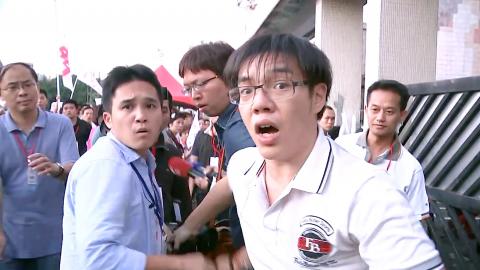Chinese Nationalist Party (KMT) Legislator Chang Ching-chung (張慶忠) yesterday said that a man caught on camera beating a television news cameraman at the KMT’s 121st anniversary celebration on Sunday afternoon was his youngest son.
Chang told the Chinese-language Apple Daily that it was his third son, Chang Chun-yung (張鈞詠), who was seen assaulting CtiTV cameraman Kuo Hsien-yang (郭先揚) at the event in New Taipei City’s Banciao District (板橋).
Chang said it was the first time his son had attended such an event.

Photo: Yu Heng, Taipei Times
“My wife [KMT New Taipei City Councilor Chen Ching-ting (陳錦錠)] will take care of the matter and she is very sorry about this,” he said.
The lawmaker, his wife and Chang Chun-yung appeared together late yesterday, bowing and apologizing over the incident.
Chang Chun-yung works as an assistant to his mother.
The incident occurred as reporters, photographers and videographers rushed former KMT chairman Wu Poh-hsiung (吳伯雄), seeking an interview, who kept walking and not responding to questions. Kuo allegedly bumped into Chen or Chang Chun-yung in the process, and the young man reportedly began swearing at him.
According to Kuo, Chang Chun-yung wrapped his arms around his neck and threw him and his camera to the ground, which caused abrasions on his back.
“He then tried to snatch my camera out of my hand, causing some contusions and scratches on my left wrist,” Kuo said.
The cameraman said he has filed charges against Chang Chun-yung and demanded compensation for his damaged camera.
CtiTV’s news channel yesterday released a statement condemning the violence, adding that police are investigating the incident to determine who was at fault.
The incident is another blow for Chang Ching-chung, who is one of the three KMT lawmakers and legislative candidates targeted by the “Voting Out Candidates Movement” initiated by several activist groups.
The groups have cited his move to rush the contentious cross-strait service trade agreement through a legislative committee review in March last year, as well as his stand against lowering the recall threshold and the suspension of construction of the Fourth Nuclear Power Plant, as the reasons he should be voted out of office.
People First Party (PFP) Deputy Secretary-General Liu Wen-hsiung (劉文雄) called on the public not to resort to verbal or physical violence against reporters, saying most of them are professional and diligent and are willing to risk their lives to get first-hand information.
“The culprit represents the city councilor he works for. If he dares treat a reporter in such a manner, how is he going to treat ordinary people? As the old saying goes: A crooked stick will have a crooked shadow,” Liu said.

Taiwan is stepping up plans to create self-sufficient supply chains for combat drones and increase foreign orders from the US to counter China’s numerical superiority, a defense official said on Saturday. Commenting on condition of anonymity, the official said the nation’s armed forces are in agreement with US Admiral Samuel Paparo’s assessment that Taiwan’s military must be prepared to turn the nation’s waters into a “hellscape” for the Chinese People’s Liberation Army (PLA). Paparo, the commander of the US Indo-Pacific Command, reiterated the concept during a Congressional hearing in Washington on Wednesday. He first coined the term in a security conference last

Prosecutors today declined to say who was questioned regarding alleged forgery on petitions to recall Democratic Progressive Party (DPP) legislators, after Chinese-language media earlier reported that members of the Chinese Nationalist Party (KMT) Youth League were brought in for questioning. The Ministry of Justice Investigation Bureau confirmed that two people had been questioned, but did not disclose any further information about the ongoing investigation. KMT Youth League members Lee Hsiao-liang (李孝亮) and Liu Szu-yin (劉思吟) — who are leading the effort to recall DPP caucus chief executive Rosalia Wu (吳思瑤) and Legislator Wu Pei-yi (吳沛憶) — both posted on Facebook saying: “I

The Ministry of Economic Affairs has fined Taobao NT$1.2 million (US$36,912) for advertisements that exceed its approved business scope, requiring the Chinese e-commerce platform to make corrections in the first half of this year or its license may be revoked. Lawmakers have called for stricter enforcement of Chinese e-commerce platforms and measures to prevent China from laundering its goods through Taiwan in response to US President Donald Trump’s heavy tariffs on China. The Legislative Yuan’s Finance Committee met today to discuss policies to prevent China from dumping goods in Taiwan, inviting government agencies to report. Democratic Progressive Party Legislator Kuo Kuo-wen (郭國文) said

Sung Chien-liang (宋建樑), who led efforts to recall Democratic Progressive Party (DPP) Legislator Lee Kun-cheng (李坤城), was released on bail of NT$80,000 today amid outcry over his decision to wear a Nazi armband to questioning the night before. Sung arrived at the New Taipei District Prosecutors’ Office for questioning in a recall petition forgery case last night wearing a red armband bearing a swastika, carrying a copy of Adolf Hitler’s Mein Kampf and giving a Nazi salute. Sung left the building at 1:15am without the armband and covering the book with his coat. Lee said today that this is a serious